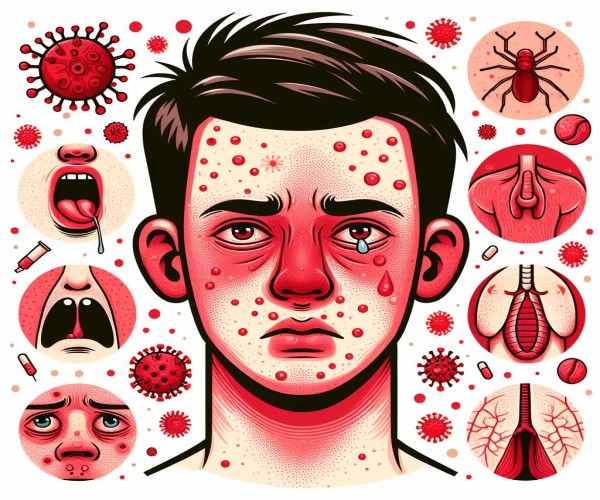Allergy
Allergy, Allergies can turn the simplest activities into daunting challenges, but with the right knowledge and preparation, managing allergens can become more manageable. Whether you’re contending with seasonal allergies, food sensitivities, or environmental triggers, here are some essential tips to help minimize the impact of allergens on your well-being.
- Know Your Triggers: Understanding what triggers your allergies is the first step to managing them effectively. Keep a journal to track your symptoms and identify patterns, whether it’s pollen in the spring, pet dander year-round, or specific foods that cause reactions.
- Create an Allergy-Free Zone: Designate a specific area in your home where allergens are minimized. Invest in allergen-proof covers for pillows and mattresses, use an air purifier with a HEPA filter, and regularly clean surfaces to remove dust and pet dander.
- Stay Informed About Pollen Counts: Monitor pollen counts in your area and plan outdoor activities accordingly. On high pollen days, try to stay indoors during peak pollen hours, typically in the early morning and evening.
- Practice Good Hygiene: Regular handwashing can help remove allergens from your skin and prevent them from entering your body. Additionally, showering and changing clothes after spending time outdoors can minimize the spread of allergens in your home.
- Choose Allergy-Friendly Foods: If you have food allergies or sensitivities, be diligent about reading labels and asking about ingredients when dining out. Stock your kitchen with allergy-friendly alternatives and consider cooking at home more often to have better control over what you eat.
- Keep Medications Handy: Always carry your prescribed allergy medications, such as antihistamines or epinephrine injectors for severe allergic reactions (anaphylaxis). Be proactive about taking medications before exposure to known allergens, especially during peak allergy seasons.
- Wear Protective Gear: When gardening or performing outdoor activities, wear a pollen mask, gloves, and long sleeves to minimize contact with allergens. Sunglasses can also help protect your eyes from pollen and other airborne irritants.
- Consult an Allergist: If your allergies are severe or persistent, consider seeking help from an allergist who can perform tests to identify specific triggers and develop a personalized treatment plan. This may include allergy shots (immunotherapy) or other medications to help desensitize your immune system.
- Stay Hydrated: Drinking plenty of water can help thin mucus and flush allergens from your system. Additionally, staying hydrated can help alleviate symptoms like dry throat and congestion commonly associated with allergies.
- Practice Stress Management: Stress can exacerbate allergy symptoms, so finding healthy ways to manage stress, such as meditation, yoga, or deep breathing exercises, can help reduce the severity of your allergic reactions.
By incorporating these allergy survival essentials into your daily routine, you can take proactive steps to minimize the effects of allergens on your well-being. Remember, managing allergies is a continuous process, but with patience and perseverance, you can enjoy a healthier, more comfortable life, free from the burden of allergic reactions.

Of course! Here are a few additional lines to further enhance the article:
- Invest in Allergy-Proof Bedding: Opt for hypoallergenic bedding materials, such as those made from bamboo or organic cotton, to create a more allergy-friendly sleep environment.
- Practice Nasal Irrigation: Using a saline nasal rinse or neti pot can help flush allergens from your nasal passages and alleviate congestion, making it easier to breathe and reducing sinus pressure.
- Limit Exposure to Indoor Allergens: Keep windows closed during high pollen seasons and use a dehumidifier to control humidity levels, which can help prevent the growth of mold and dust mites.
- Consider Allergy-Friendly Pets: If you’re allergic to pet dander but still want furry companionship, choose hypoallergenic breeds or consider alternative pets like fish or reptiles that are less likely to trigger allergic reactions.
- Stay Vigilant During Travel: Research your destination’s allergen triggers beforehand and pack accordingly. Bring along any necessary medications or allergy remedies, and be cautious when trying new foods or encountering unfamiliar environments.
- Educate Others: Raise awareness about allergies and their impact on daily life by sharing your experiences with friends, family, and coworkers. Encourage empathy and understanding for those living with allergies and advocate for allergy-friendly accommodations in public spaces.
- Plan Ahead for Allergy Seasons: Take proactive measures to prepare for peak allergy seasons, such as stocking up on allergy medications, scheduling regular check-ups with your allergist, and updating your allergy action plan as needed.
- Monitor Your Symptoms: Keep track of your allergy symptoms over time and make note of any changes or patterns. This information can help you and your healthcare provider adjust your treatment plan as necessary to better manage your allergies.
- Seek Support from Allergy Communities: Join online forums or local support groups for individuals with allergies to connect with others facing similar challenges. Sharing tips, experiences, and resources can provide valuable support and reassurance on your allergy journey.
- Celebrate Small Victories: Recognize and celebrate the progress you make in managing your allergies, whether it’s finding a new allergy-friendly recipe, successfully navigating a pollen-heavy season, or simply enjoying a symptom-free day. Every step forward is a victory worth celebrating in your journey toward better allergy management.


















I completely agree with your points. Well said!